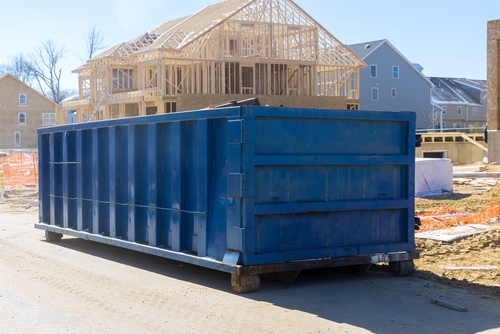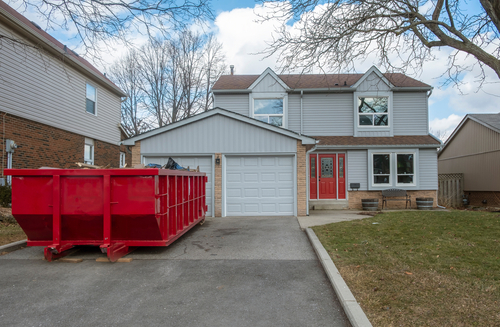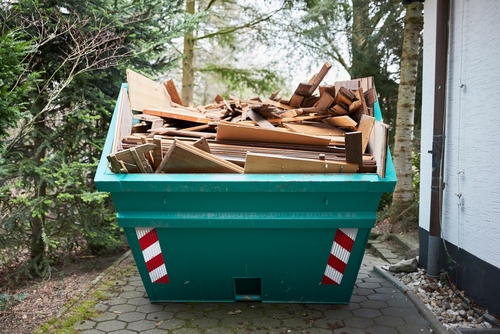Deciding how many dumpsters you need for your project can be a daunting task. Whether you’re planning to demolish a house, undertake a large cleanout, or manage construction debris, estimating the right number of dumpsters is crucial for efficiency and cost-effectiveness. For building a typical 2,000 sq. ft. house, you might need around six to seven 40-yard dumpsters to handle the debris, excluding the concrete foundation.
Choosing the right dumpster size depends on various factors, including the type and volume of waste, as well as specific project requirements. For example, a 30-yard dumpster holds about 245 cubic yards of debris, which might be suitable for smaller projects. On the other hand, using a 40-yard dumpster could offer some extra space, helping you avoid the hassle of renting additional containers.
Understanding these dynamics will help you make an informed decision, ensuring you have adequate space for all your waste without overspending. Assess your project scope carefully, consider the type of materials you’re disposing of, and plan accordingly to streamline your waste management process.
 When selecting a construction or residential dumpster, it’s essential to consider the type of materials you will be disposing of. Different debris types require different dumpster sizes and types to efficiently handle disposal needs.
When selecting a construction or residential dumpster, it’s essential to consider the type of materials you will be disposing of. Different debris types require different dumpster sizes and types to efficiently handle disposal needs.
 Determining the right number and size of dumpsters for your project is essential. You’ll need to consider both the scope of your project and the total volume of waste material expected.
Determining the right number and size of dumpsters for your project is essential. You’ll need to consider both the scope of your project and the total volume of waste material expected.
 Regulations and restrictions for dumpster use are essential to ensure the safety and compliance of your waste disposal project. Key considerations include permit requirements and weight and material restrictions.
Regulations and restrictions for dumpster use are essential to ensure the safety and compliance of your waste disposal project. Key considerations include permit requirements and weight and material restrictions.
Key Takeaways
- Understand the size and type of dumpsters needed for your project
- Assess the volume and type of debris when choosing a dumpster
- Proper planning helps avoid additional rental costs
Understanding Dumpster Sizes
Choosing the right dumpster size for your project is essential to manage waste efficiently and avoid overpaying. To determine which dumpster suits your needs, it’s important to know the common dimensions and capacities.Common Dumpster Dimensions
Dumpsters come in various sizes, each designed for specific types of projects. Here’s a breakdown of the most common dumpster sizes:- 10 Yard Dumpster: Measures approximately 12 to 14 feet long, 8 feet wide, and 3.5 to 4 feet high. It’s ideal for small remodeling projects or medium-sized clean-ups.
- 20 Yard Dumpster: Generally about 22 feet long, 8 feet wide, and 4.5 feet high. Suitable for medium-sized renovation projects or large home cleanouts.
- 30 Yard Dumpster: Typically 22 feet long, 8 feet wide, and 6 feet high. Best for larger renovation projects or more extensive cleanouts.
- 40 Yard Dumpster: Measures around 22 feet long, 8 feet wide, and 8 feet high. Ideal for large construction or demolition projects.
Comparing Capacity in Cubic Yards
Understanding cubic yard capacity is crucial when choosing a dumpster. A cubic yard is a space that measures 3 feet by 3 feet by 3 feet, or 27 cubic feet.- 10 Yard Dumpster: Can hold up to 10 cubic yards, roughly equivalent to 3 pickup truck loads of debris. Perfect for small-scale projects like garage cleanouts.
- 20 Yard Dumpster: Holds 20 cubic yards, about 6 pickup truck loads. Great for larger cleanouts or medium-sized renovation tasks.
- 30 Yard Dumpster: Provides 30 cubic yards of space, equating to 9 pickup truck loads. Useful for more significant home renovation projects.
- 40 Yard Dumpster: Holds a massive 40 cubic yards, or 12 pickup truck loads. Best for major construction or demolition works.
Projects and Dumpster Requirements
Choosing the correct dumpster size for your project is crucial. Different projects, ranging from small residential cleanouts to large-scale commercial construction, demand different dumpster dimensions. Accurate estimation helps in avoiding extra costs and logistical issues.Residential Projects
For residential cleanouts, like clearing out a garage or an attic, a 10-yard dumpster is typically sufficient. If you’re undertaking a home remodel, especially kitchen remodels, consider a 20-yard dumpster. This size can comfortably handle debris from cabinets, countertops, and flooring. A roofing project usually requires a 20 to 30-yard dumpster. This depends on the size of the roof and the volume of shingles. Landscaping projects might need a 15-yard dumpster for large amounts of yard waste. Smaller yard cleanups can manage with a 10-yard dumpster.Commercial and Construction Projects
Commercial construction projects and large-scale remodeling projects often start with estimating the volume of waste. Projects demolishing entire buildings might need multiple 40-yard dumpsters. For smaller commercial renovations, a 20 or 30-yard dumpster could be adequate. In construction, it’s essential to consider the types of materials. Heavy debris like concrete and bricks usually need smaller 10 or 20-yard dumpsters to comply with weight limits. Regularly scheduled dumpster pickups may be necessary for ongoing projects. Understanding your project’s scope ensures efficient waste management and budgeting for the correct dumpster sizes.Choosing the Right Dumpster for Specific Materials
 When selecting a construction or residential dumpster, it’s essential to consider the type of materials you will be disposing of. Different debris types require different dumpster sizes and types to efficiently handle disposal needs.
When selecting a construction or residential dumpster, it’s essential to consider the type of materials you will be disposing of. Different debris types require different dumpster sizes and types to efficiently handle disposal needs.
Inert Materials and Heavy Debris
Inert materials and heavy debris, such as concrete, bricks, and asphalt, usually require a specialized dumpster. These materials are dense and heavy, so you will typically need a roll-off dumpster that can withstand substantial weight without damaging the container. For such projects, a 10-yard dumpster is commonly used because it can handle the weight while being easy to manage on-site. This size is ideal for small-scale demolition or construction materials, including concrete slabs and roofing tear-offs. If you’re dealing with larger amounts of heavy debris, consider a 20-yard dumpster. This can hold roughly 6 pickup truck loads of material, making it suitable for more extensive construction or renovation projects.Mixed Waste and General Junk
Mixed waste and general junk usually involve a combination of household items, yard waste, and minor construction debris. For these tasks, versatility is key, as the dumpster will need to accommodate various debris types. A 20-yard dumpster is often the go-to choice for mixed waste because it strikes a balance between capacity and ease of use. It’s capable of handling significant amounts of household junk, green waste from landscaping projects, and even small amounts of construction debris. For larger cleanouts or remodeling projects, a 30-yard dumpster may be necessary. This size is beneficial for large home cleanouts, commercial renovations, and other substantial projects. It can hold up to nine pickup truck loads of mixed materials, making it incredibly versatile for various tasks.Cost Considerations for Dumpster Rentals
When renting a dumpster, understanding your expenses is essential. This section will cover the pricing related to the rental period as well as potential additional fees that may impact your budget.Rental Period and Pricing
The cost of a dumpster rental largely depends on the duration of the rental period. Typically, rental companies offer dumpsters for set periods, such as daily, weekly, or monthly rates. For instance, a 10-yard dumpster might cost between $200 and $400 for a week. Meanwhile, a 20-yard dumpster can range from $250 to $650 per week. It’s wise to balance your project timeline with these costs to avoid overspending. Rental agreements usually specify a base charge for a certain period. Extending your rental beyond the agreed timeframe can incur extra daily fees. These fees vary, so it’s crucial to clarify this aspect before proceeding with the rental.Potential Additional Fees
In addition to the base rental price, you should be aware of potential additional fees. Overfilling the dumpster is one common cost factor. Dumpsters have weight limits, and surpassing them can result in overage fees. Charges also apply for prohibited items like hazardous waste or electronic appliances, which require special disposal methods. Location affects costs too. Urban areas with higher dumping fees will increase your overall expense. Furthermore, if your project site is difficult to access, extra transport fees might be imposed. To avoid unexpected charges, always ask your rental provider about any potential extra costs and dumpster rental restrictions. This foresight helps you to manage your budget more effectively.Assessing Project Scope and Dumpster Quantity
 Determining the right number and size of dumpsters for your project is essential. You’ll need to consider both the scope of your project and the total volume of waste material expected.
Determining the right number and size of dumpsters for your project is essential. You’ll need to consider both the scope of your project and the total volume of waste material expected.
Single vs. Multiple Dumpster Rentals
For smaller projects, such as minor home renovations or single-room remodels, one dumpster may be sufficient. A 30-yard dumpster is often suitable for these tasks, providing ample space for debris up to 30 cubic yards. Larger projects, such as commercial construction or major home renovations, require more extensive waste management. You might need multiple 40-yard dumpsters to handle the volume of debris. The scale of the construction and types of materials impact the dumpster size and number needed. Thorough project scope assessment will help determine if multiple rentals are necessary. Calculate the cubic feet of waste anticipated and compare it with the capacity of available dumpsters to ensure efficient waste disposal.Logistics of Dumpster Rental Services
Understanding the logistics involved in dumpster rental services ensures a smooth process from start to finish. Key areas include scheduling, delivery, placement, and pickup considerations, which play crucial roles in ensuring efficiency.Scheduling and Delivery
Prompt scheduling is essential to meet project timelines. Contact your dumpster service well in advance to confirm availability. Specify details such as the type and size of the dumpster, and the duration of the rental period. Roll-off dumpsters are common for most projects due to their versatility. Ensure you provide specific instructions for the delivery location to avoid any confusion. Clear access paths and determine if permits are needed, especially in urban areas. Accurate scheduling helps in avoiding delays and added costs. Confirm delivery times to coordinate with your project schedule seamlessly.Placement and Pickup Considerations
The placement of the rental dumpster is critical for operational efficiency. Choose a flat, hard surface like a driveway or construction site pace. Avoid placing it on soft ground to prevent sinking or damage. Be mindful of local regulations regarding dumpster placement. Some municipalities may have restrictions or require permits for street placement. Ensure there’s ample space around the dumpster for safe loading and unloading of debris. For pickup, confirm arrangements with your dumpster rental provider. Ensure the path to the dumpster is clear of obstacles and that the container is not overloaded or contains prohibited items. Clear instructions on placement and pickup help prevent unnecessary complications.Regulations and Restrictions for Dumpster Use
 Regulations and restrictions for dumpster use are essential to ensure the safety and compliance of your waste disposal project. Key considerations include permit requirements and weight and material restrictions.
Regulations and restrictions for dumpster use are essential to ensure the safety and compliance of your waste disposal project. Key considerations include permit requirements and weight and material restrictions.
Permit Requirements
When renting a roll-off dumpster, you often need a permit, especially if the dumpster will be placed on public property. Obtaining this permit is crucial to avoid fines and legal issues. Municipal regulations and permit requirements can vary widely. Contact your local government or waste management authority to understand specific requirements for your area. Homeowners living in areas governed by Homeowners Associations (HOAs) should also seek approval, as HOAs may have strict regulations regarding where a dumpster can be placed. They often impose these rules to maintain community aesthetics. It’s important to factor in the time needed to obtain a permit. Depending on your locality, this process can take anywhere from a few days to a couple of weeks. Always plan accordingly to avoid project delays.Weight and Material Restrictions
Understanding weight and material restrictions is critical when renting a dumpster. Dumpsters have specific weight limits that, if exceeded, can incur extra charges. These limits are usually based on the dumpster’s capacity, measured in cubic yards. A common restriction includes prohibiting the disposal of hazardous materials such as chemicals, batteries, and certain types of electronics. Always verify the types of materials allowed with your rental provider. Different projects, such as home renovations or construction, produce varying types of waste. Select a dumpster size—like a 10-yard or 40-yard dumpster—appropriate for the volume and type of debris you plan to discard. This can help you avoid overfilling and subsequent penalties. Local traffic regulations may also impact the placement of heavy dumpsters to prevent damage to road surfaces and ensure safety. Make sure to place the dumpster on a hard, level surface capable of supporting its weight when filled.Environmental Considerations and Waste Management
Effective waste management requires attention to recycling and environmentally friendly disposal practices. Focus on sorting waste correctly to minimize landfill use and support sustainable practices.Recycling and Responsible Disposal
- Recycling plays a crucial role in waste management. You should separate recyclable materials such as plastics, metals, and paper from non-recyclable waste.
- Correct sorting facilitates recycling centers in processing materials efficiently. Make use of designated recycling bins and educate others on their importance.
- Green waste involves organic materials like tree removal debris and grass clippings. Compost these to create natural fertilizers, reducing landfill waste.
- Environmentally friendly disposal includes the safe handling of hazardous materials. Ensure items like batteries and chemicals are taken to appropriate disposal facilities.
- Proper waste management promotes sustainability and reduces environmental impact. Pay attention to local regulations to enhance your efforts.
Case Studies and Recommended Sizes
Different projects require different dumpster sizes, and choosing the wrong size can lead to unnecessary complications. Understanding the specific needs of residential versus commercial projects helps determine the most suitable dumpster capacity.Residential vs. Commercial Dumpster Usage
Residential projects generally involve smaller scale tasks. A 10-yard dumpster is ideal for garage cleanouts or minor landscaping projects. For larger household tasks, like kitchen remodels, a 15-yard or 20-yard dumpster might be more appropriate. These units handle moderate amounts of debris without taking up too much space. Commercial projects, on the other hand, often require much larger construction dumpsters. For sizable renovations or full home demolitions, a 30-yard or 40-yard dumpster provides ample capacity. Commercial construction jobs typically involve significant amounts of debris, making the largest dumpsters necessary to avoid frequent emptying.Specific Project Examples
- For a kitchen remodel, using a 20-yard dumpster accommodates cabinets, countertops, and flooring. A 10-yard option might not suffice due to higher debris volume.
- A garage cleanout would likely require a 10-yard dumpster since it can handle discarded items without occupying excessive space.
- Home demolitions are best served by 30 or 40-yard dumpsters. These large units manage heavy-duty materials like concrete, wood, and metals.
- In commercial construction, such as building new structures, a 40-yard dumpster ensures you have enough room for daily waste accumulation. This prevents work interruptions for waste removal.
- For smaller residential cleanouts, a 10 to 15-yard dumpster is suitable. This size effectively contains household items and avoids taking up too much driveway space.
Frequently Asked Questions
Selecting the correct dumpster size and quantity depends on the project type and debris volume. This section provides specific advice on common queries related to dumpster rentals.What size dumpster is typically required for a residential cleanout?
For a typical residential cleanout, a 10- to 15-yard dumpster is usually sufficient. It can accommodate common household items and some larger objects without taking up excessive space in your driveway.What factors determine the number of dumpsters needed for a demolition project?
The number of dumpsters required for a demolition project depends on the project’s scale, type of materials, and whether materials can be recycled. Understanding the volume and weight of the debris is crucial.How is the volume of debris for a construction project calculated?
To calculate the volume of debris for a construction project, measure the dimensions of debris piles and estimate the total cubic yards. This can help determine whether multiple dumpsters are necessary.Can large furniture fit into a standard-sized dumpster, and if so, which size?
Yes, large furniture can fit into standard-sized dumpsters. A 20-yard dumpster is often recommended, as it provides ample space for bulkier items like couches and tables.What is the capacity of a 20-yard dumpster for heavy materials like dirt?
A 20-yard dumpster can typically hold about 20 cubic yards of material, but for heavy materials like dirt, capacity is reduced. It can hold approximately 10-15 cubic yards of dirt to ensure safe transport.What are the considerations for selecting the appropriate dumpster size for an apartment complex renovation?
For an apartment complex renovation, consider the number of units, types of materials being disposed of, and space for dumpster placement. A mix of 30- and 40-yard dumpsters may be appropriate to handle large volumes of waste efficiently.RECENT BLOGS
 A Homeowner’s Guide to Flash Flood Preparation, Cleanup, and Long-Term Protection
A Homeowner’s Guide to Flash Flood Preparation, Cleanup, and Long-Term Protection
Date: May 27 ,2025
 Everything You Need to Know About Garbage Bin Rental: Sizes, Costs, and Practical Tips for Every Project
Everything You Need to Know About Garbage Bin Rental: Sizes, Costs, and Practical Tips for Every Project
Date: May 14 ,2025
 Safe Disposal Methods for Refrigerators: Recycling, Donation, and Removal Options
Safe Disposal Methods for Refrigerators: Recycling, Donation, and Removal Options
Date: April 29 ,2025
Our Reviews
LATEST BLOGS








